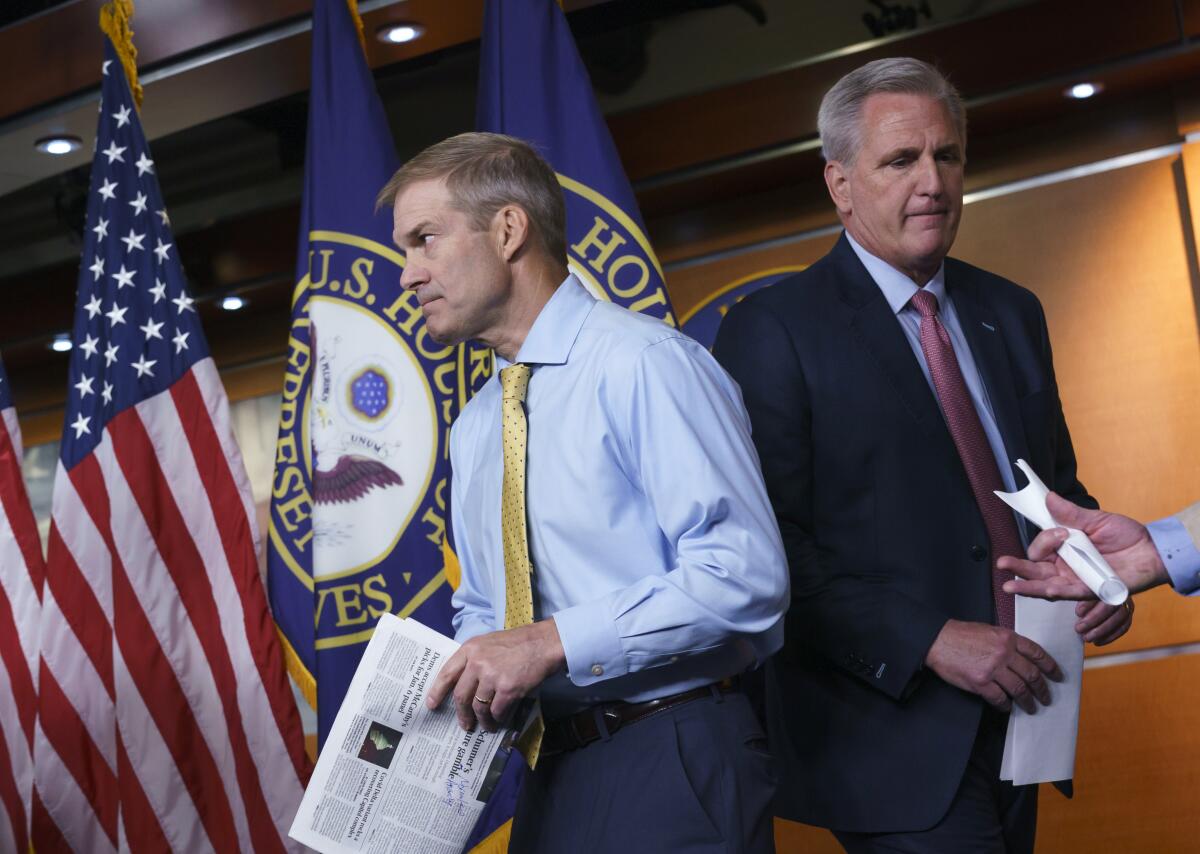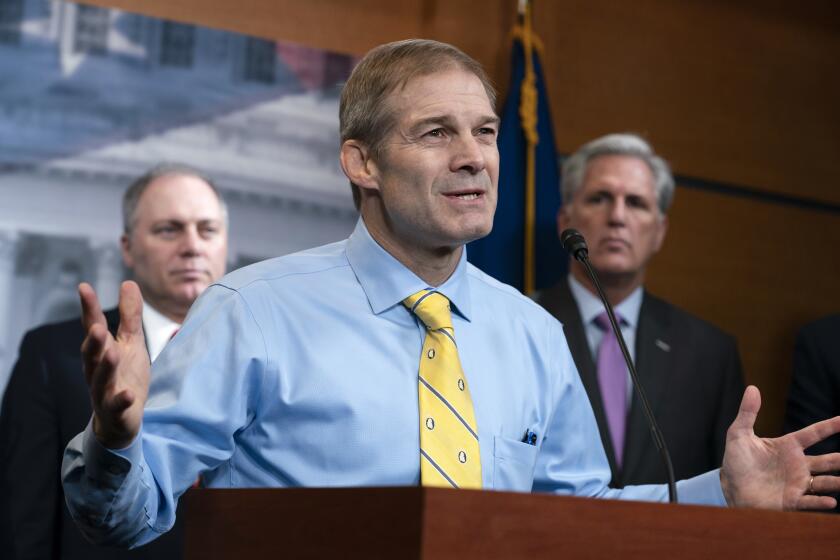The sexual abuse scandal that haunts Trump’s pick for House speaker

- Share via
WASHINGTON — Rep. Jim Jordan (R-Ohio), a darling of the right, is former President Trump’s pick to replace the ousted Kevin McCarthy as speaker of the House.
But as Jordan campaigns for the speaker’s gavel, several men from his past are speaking out about a major sexual abuse scandal at Ohio State University, where Jordan worked as an assistant wrestling coach from 1987 to 1995, repeating allegations — which Jordan denies — that he knew about the abuse.
The wrestlers and other advocates for survivors, including former Fox News star Gretchen Carlson, have argued that Jordan has missed recent opportunities to help abuse victims.
A forthcoming documentary on sexual abuse at Ohio State that actor and director George Clooney is producing for HBO could soon draw even more attention to the scandal and to Jordan, who will be the highest-ranking elected Republican in the country if elevated to speaker.
Former President Trump backs Rep. Jim Jordan, the pugnacious House Judiciary Committee chairman and Trump defender, to be the next House speaker.
Jordan has consistently denied that he knew about athletes’ allegations against university athletic doctor Richard Strauss, who sexually abused at least 177 male students between 1979 and 1996, according to a 2019 report commissioned by the university. Strauss died by suicide in 2005.
Spokesman Russell Dye repeated Jordan’s denial in a Monday email, saying the Ohio congressman “never saw or heard of any abuse, and if he had, he would have dealt with it.”
But several wrestlers Jordan coached have repeatedly and publicly alleged that he knew of the abuse.
Former wrestler Dan Ritchie told The Times that Jordan was in the locker room when players referenced Strauss’ abuse between 1989 and 1990.
“I remember a couple of occasions when we would bring up the abuse to Jim and he would say: If [Strauss] ever tried that with me, I’d snap his neck like a stick of dried balsa wood,” said Ritchie, 53. “Our coaches all knew.”
Mike Flusche, a fellow wrestler around the same time, said he remembers hearing Jordan’s “balsa wood” comment. “I was one of the people in the locker room who heard him say that, so for Jim to say he didn’t know is just a flat-out lie,” said Flusche, 57.
Michael Schyck, also a wrestler while Jordan was at the university, said he couldn’t see how Jordan had no knowledge of the abuse. “Everybody knew what Strauss was all about.”
“To say that Jordan didn’t know would be flat-out ridiculous,” Schyck, 53, said. “There was an opportunity for [Jordan] to step up and not worry about himself and be there for his guys.”
He added: “This was something that was real and that happened.”
Jordan previously claimed the 2019 report vindicated him.
But although the report said that investigators “did not identify any contemporaneous documentary evidence that members of the OSU coaching staff, including head coaches or assistant coaches, received or were aware of complaints regarding Strauss sexual misconduct,” investigators also found that student athletes openly spoke of the doctor’s abuse and that 22 unnamed coaches confirmed knowledge of the abuse.
The statute of limitations for Strauss’ abuse has long lapsed, and the university in 2022 said it settled with 296 survivors for over $60 million. The university in June failed to convince the U.S. Supreme Court to dismiss another wave of lawsuits from more than 230 men.
Jordan has recently declined to back two bipartisan bills championed by advocates for survivors.
Carlson, who sued Fox News executive Roger Ailes for sexual harassment in 2016, has in recent years become one of the most prolific advocates for legislation to prevent powerful men who engage in workplace harassment from evading consequences.
Last year, Carlson convinced President Biden and majorities of both parties to support a new law banning private companies from forcing customers and employees into arbitration over sexual harassment and assault allegations.
In a floor speech before the vote, Jordan, who opposed the legislation, complained that although “much of the push for this bill comes from concerns of secrecy ... the text of this bill never, never actually addresses confidentiality or nondisclosure agreements.”
Carlson and her allies believed that Jordan might back a bill that banned the use of NDAs in sexual harassment and abuse cases. Jordan, then serving as the ranking member of the Judiciary Committee, would be a powerful ally. So while the House was voting on the arbitration bill, she went to work on legislation, later dubbed the Speak Out Act, that would address confidentiality and nondisclosure agreements.
“I don’t even know if he realizes this, but he was the genesis for creating the Speak Out Act,” Carlson said.
When Carlson approached Jordan to confirm his support eight months later, she was stunned that he was “very noncommittal.”
Jordan was among 109 Republicans who voted against the bill.
“I was very disappointed,” Carlson said.
Jordan’s spokesman, Dye, declined to comment on Carlson’s account.
Jordan still faces stiff opposition to his effort to become speaker. But seeing his face on the national news and hearing his repeated denial that he knew about the abuse has not sat well with the survivors The Times interviewed.
“Of all people to come out and say he knew, he saw nothing, to me, was a stab in the heart and in the back,” said Ritchie, who lives outside Columbus, Ohio. Ritchie said he ended up leaving the team because of the interactions he had with Strauss, because “nobody took it seriously and if no one is doing anything about it, why am I trying to figure out how to endure it?”
Schyck, who now lives in Englewood, Fla., said Jordan’s denials are “something that should be taken into consideration” as he runs for speaker. “But I’m one person in this and my position is about a doctor that abused us.”
Flusche said that the speakership, which is second in line for the presidency, should require someone with integrity.
“I’m sure he lied to protect his political career which, unfortunately, I think a lot of politicians do but that still doesn’t make it right,” said Flusche, who lives outside Columbus, Ohio. But the role of a House speaker “should be all about character.”
“And I don’t think he has it,” he added.
More to Read
Get the L.A. Times Politics newsletter
Deeply reported insights into legislation, politics and policy from Sacramento, Washington and beyond. In your inbox twice per week.
You may occasionally receive promotional content from the Los Angeles Times.












